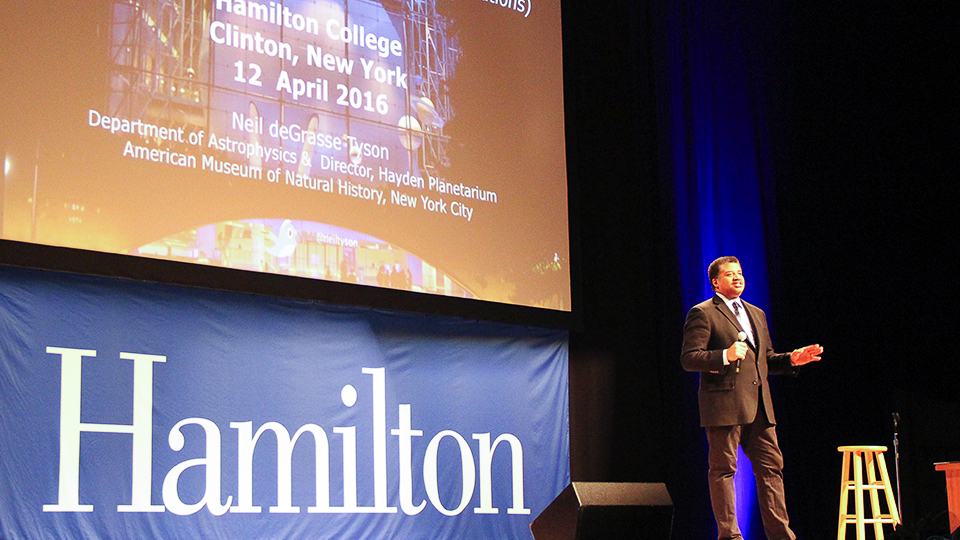News
Tyson talks science literacy in Great Names speech
By Deasia Hawkins ’18
April 14, 2016
Tags news
Hamilton College was honored to host Neil deGrasse Tyson, American astrophysicist, cosmologist, author and science communicator, as it celebrated its 20th anniversary of the Sacerdote Great Names Lecture Series.
The Field House was near capacity when the lights dimmed and President Joan Hinde Stewart introduced Tyson as the first ever scientist to be a guest in the series. From the start of Tyson’s lecture, one could tell that he was not only accessible, but that he tried very hard to make science accessible by weaving in humorous anecdotes and interacting with the audience.
While Tyson’s lecture was titled “Adventures in Science Literacy,” he delved into the mass devaluation and misunderstanding of science and mathematics that represents a global atmosphere of science illiteracy. The devaluation of such fields is not spread across the entire globe and Tyson chose to examine the value some countries place on these fields by displaying international currencies.
Germany, for example, is renowned for its engineering. They display Werner von Braun on their currency as well as a complicated-looking distribution equation curve. This doesn’t necessarily signify widespread knowledge of the distribution curve, but Tyson hypothesized that German citizens “know that it’s math and that it’s important because it’s on the currency.” The inclusion of math on German currency allows citizens to both become familiar with it and become curious about it.
Interestingly, American currency does in fact include a scientist on the 100 dollar bill: Benjamin Franklin. Yet the one hundred-dollar bill does not hint at Frankllin’s mathematic or scientific achievement
. There are no kites or lightning. That is because Franklin is more remembered for being a Founding Father than for any of his scientific discoveries and inventions.
Across the globe, mathematics has been socially devalued and critical thinking has yet to be resurrected. Tyson illustrated this point by displaying the recipients of the Nobel Prize, showing that about 25 percent are Jewish and .46 percent are Muslim. Tyson is haunted by this fact and states, “I lay awake at night lamenting the fact that in this world we have 1.5 billion people who are not participating in the frontier of discovery but who used to.”
Tyson also talked about a concept called “Bad Science,” and how the American media is without a doubt scientifically illiterate. He recounted an instance where an online article gives instructions on how to get to the moon, as if it’s not a gigantic object in the sky.
He pointed out another instance of “bad science” in a USA Today article implying that red moons signaled the end of the world but show a picture of a setting sun. “You have to have objective realities,” stated Tyson. “You have to be objective when you have influence over others. Otherwise we won’t have an informed democracy.”
Disasters such as oil spills and collapsing bridges frustrate Tyson. He claimed that such events are the result of faulty engineering and scientific illiteracy. As humans, we are too proud to admit when we make mistakes. “We have the intellectual capacity to grow up,” claimed Tyson, emphasizing that we are responsible for what happens to our world.
Tyson’s lecture wasn’t about trying to transform the audience into science lovers. “You don’t have to be a scientist to be science literate,” he told the audience.
It is important to understand that truly knowing our planet and the impact we make is necessary to preserving it, Tyson emphasized. During the Environmental Movement, NASA made citizens see the earth from a different perspective. “We went to the moon and discovered earth for the first time,” recapped Tyson. He said humans now need to rediscover earth again. In order to do so, people must appreciate science and math; people must become scientifically literate.





